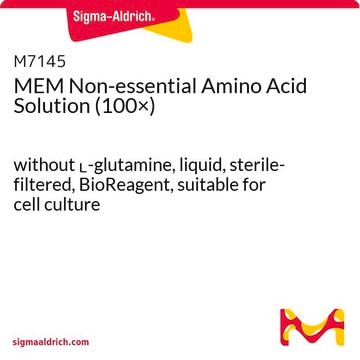G9654
Gentamicin-Glutamine
solution, suitable for cell culture, BioReagent
About This Item
Recommended Products
product name
Gentamicin-Glutamine solution, with 200 mM L-glutamine and 5 mg gentamicin per mL in tissue culture grade water, liquid, 0.1 μm filtered, BioReagent, suitable for cell culture
Quality Level
sterility
0.1 μm filtered
product line
BioReagent
form
liquid
potency
5-6 mg per mL
technique(s)
cell culture | mammalian: suitable
impurities
endotoxin, tested
antibiotic activity spectrum
Gram-negative bacteria
Gram-positive bacteria
mycoplasma
Mode of action
protein synthesis | interferes
shipped in
dry ice
storage temp.
−20°C
General description
Application
Biochem/physiol Actions
Antimicrobial spectrum: This product acts against both gram-negative and gram-positive bacteria, and mycoplasma.
Components
Caution
Storage Class Code
12 - Non Combustible Liquids
WGK
WGK 1
Flash Point(F)
Not applicable
Flash Point(C)
Not applicable
Personal Protective Equipment
Certificates of Analysis (COA)
Search for Certificates of Analysis (COA) by entering the products Lot/Batch Number. Lot and Batch Numbers can be found on a product’s label following the words ‘Lot’ or ‘Batch’.
Already Own This Product?
Find documentation for the products that you have recently purchased in the Document Library.
Our team of scientists has experience in all areas of research including Life Science, Material Science, Chemical Synthesis, Chromatography, Analytical and many others.
Contact Technical Service





